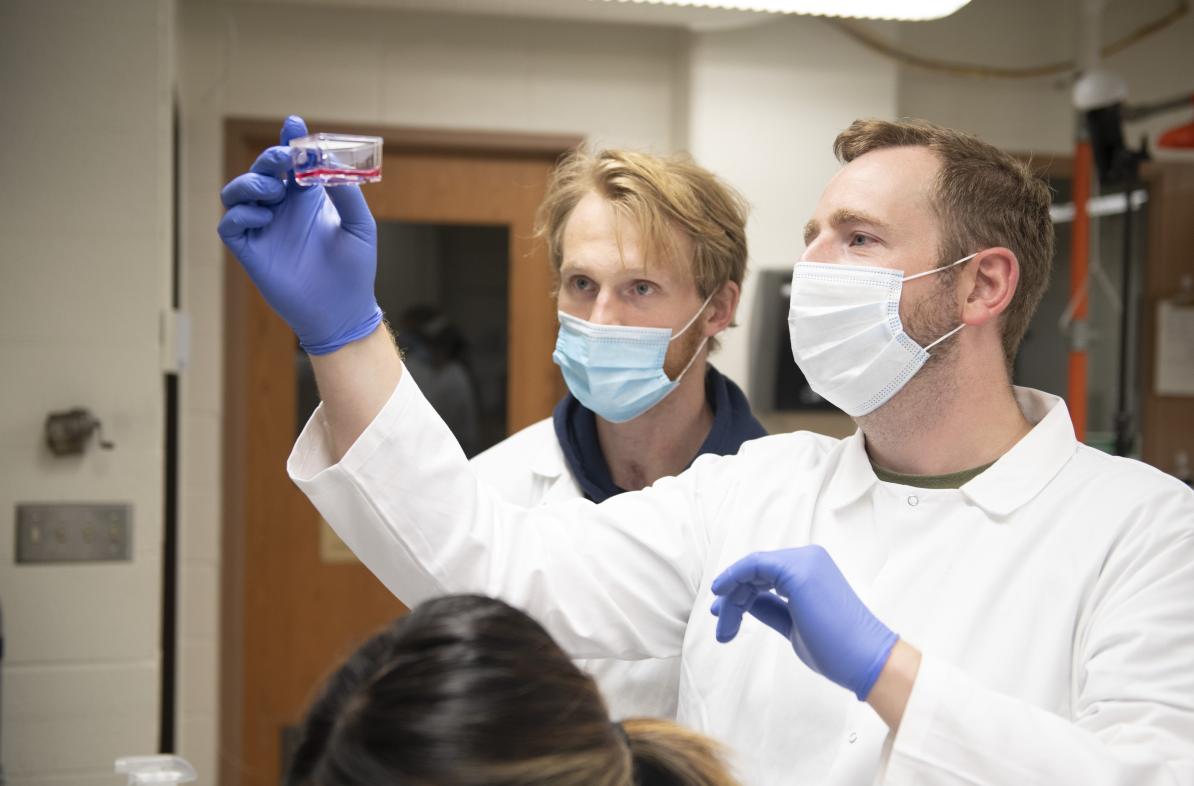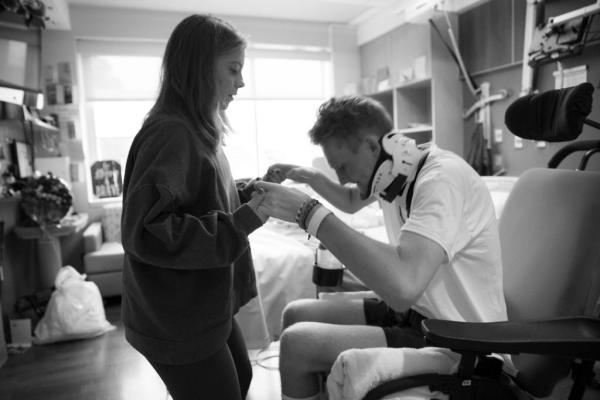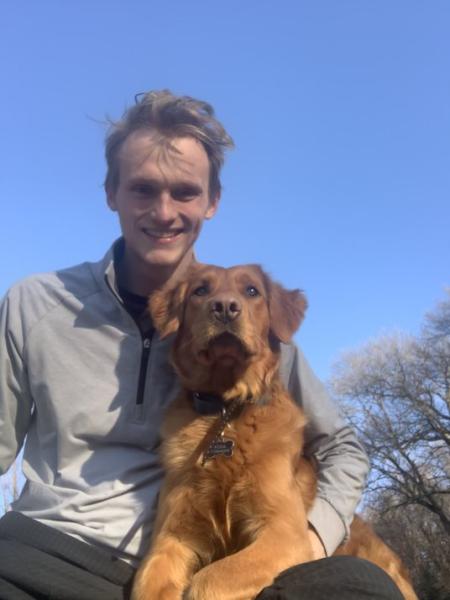
Blugold still swinging for the fences after spinal cord injury changed his life
Zach Caterer was volunteering at a summer youth camp when a water accident left him with a spinal cord injury, changing his life forever. Now at UW-Eau Claire, he's excelling in and out of the classroom as he embraces his "new normal."
Zach Caterer grew up playing baseball, so he knows that if a pitcher throws you a curveball, you must adjust your swing if you want to hit a home run.
Four years after life threw him a curveball he never saw coming, Caterer still is making adjustments and swinging for the fences.
The University of Wisconsin-Eau Claire sophomore was volunteering at a summer youth camp in northern Minnesota when he and his friends decided to take a nighttime swim. Then a high school junior, Caterer jumped into the lake in “exactly the wrong place.”
His jump left him with a spinal cord injury, changing his life forever.
“I definitely think my injury has helped me understand that the good things in life don’t come easy,” Caterer says. “If you really want it, you have to work for it. It’s not going to happen tomorrow.”
Creating a ‘new normal’
Caterer remembers just bits and pieces of the night of his water accident. He remembers hanging out with his friends after working in the dining hall. The helicopter that flew him to the hospital. Asking a doctor to take a picture of him to send to his mom.
Fortunately, he says, he doesn’t remember anything about the three weeks following the accident because his doctors kept him heavily sedated as his body began to heal. He was in the hospital for three months. Then came six months of nearly daily physical therapy, which, he jokes, helped him set a record at his high school for most days missed during his junior and senior years.
He’s thankful that in time, he did regain some of his motor function, including his ability to walk using braces.
“It’s different for everyone, but most people with this injury expect to always be in a wheelchair,” Caterer says. “I’m fortunate that I can get up and move around and walk.”
While his physical recovery has plateaued, Caterer still describes his recovery as “ongoing” because he’s continuously tweaking what he considers to be his “new normal.”
“I say I’m still in recovery because I have a lot of goals that I want to achieve,” Caterer says. “I keep pushing myself to be better. I’m never completely satisfied, so there is always that next ‘something’ that I want to accomplish. I see being in recovery as meaning that I’m still growing, which is a good thing.”
For now, Caterer’s “new normal” mostly revolves around his college classes, his undergraduate student research, his job on campus as a math tutor and — best of all, he says — his dog, a golden retriever named Koda, who he got early in the COVID-19 pandemic.

Finding Inspiration
While the months he spent in the hospital were hard physically and mentally, he’ll always be grateful for the incredible team of doctors, nurses, physical therapists and other medical professionals who guided him as he found his way forward. Their passion, kindness and care helped him get through even his darkest days.
“It didn’t feel like I was in the hospital because everyone there absolutely loved their jobs and brought their energy and passion every single day,” Caterer says. “They always had a positive attitude and always were uplifting and always came in with a smile.”
Four years after his injury, Caterer isn’t expecting to regain any more nerve or muscle function naturally. He is hopeful, though, that advances in medicine, science and technology may someday lead to new regenerative or other therapies to treat spinal cord injuries like his.
“It’s always in the back of my mind,” Caterer says of potential medical advances. “I’m aware there is work that’s ongoing. But for now, I consider my situation to be normal for me.”
Caterer loves math and science, so he’d always had vague thoughts of maybe being a doctor someday. His time in the hospital “solidified” that idea. So, while he’s not closing any other doors quite yet, he’s “definitely leaning toward” medical school and a career as a physician. Specializing in spinal cord injuries is a possibility, though there are other areas within medicine that also interest him.
“The one thing I do know is that I want to use my science and math to help people,” Caterer says. “I want to go to work with a positive attitude and to love my job every day, just like the people I was with in the hospital.”
A new path
A standout high school student and athlete, Caterer knew he’d go to college, but he assumed baseball would be a deciding factor in where he’d go. When baseball was no longer an option, he had to rethink what mattered most to him when choosing a college.
He was considering several schools — some nearby and some farther from home — when COVID-19 hit. He knew that if he had to quarantine or had other COVID-related issues, he didn’t want to be living in a dorm room far from home with people he didn’t know. So, Caterer decided UW-Eau Claire was the best place for him.

Two years later, he says coming to UW-Eau Claire was the right decision for reasons that go far beyond the pandemic.
“I’m glad I chose it because the faculty and staff here are wonderful,” Caterer says. “Eau Claire has really good programs in my areas of interest. And I’m doing research here that’s usually reserved for graduate students, research that I got into when I was still a freshman.”
When he was a freshman, Caterer loved his biology lab. Curious about everything they were studying, he had lots of questions, so he regularly visited his professor, Dr. Michael Walsh, an assistant professor of materials science and biomedical engineering, during his office hours.
Walsh says he was “immediately impressed by Zach’s interest and curiosity in biology and medicine.”
When Caterer learned that Walsh does health care-related research with a team of undergraduate students, he was intrigued. He admires Walsh’s passion for his work, and the professor’s research areas align with his own interests. He knew right away that he wanted to join Walsh’s research team.
By then, Walsh already knew Caterer would excel in research, so he was happy to add him to his team.
“Zach is an extremely curious person, which makes him perfect for being both a student and researcher,” Walsh says. “He also is very conscientious, detail orientated and organized, which are also important skills to have. Furthermore, he is very well liked and respected by his peers.”
Caterer appreciates the research opportunities Walsh and UW-Eau Claire offer undergraduate students, opportunities he says he likely would not have had if he’d gone to another college.
“I was super excited because he got me started on a project right away,” Caterer says. “I have friends who go to bigger universities, and they say they don’t even see their professors. Here, I was a freshman already doing research with my professor. It’s been a great experience.”
Already, he’s been part of multiple research projects.
Caterer is excited to present his current research next month at Research in the Rotunda, an annual event held in the state Capitol that showcases research done by undergraduate students at UW System schools. Each campus selects just a handful of students to present their research during the daylong event, which is attended by state legislators and others.
Caterer will present the research he does with Walsh that aims to help people with end-stage renal disease, a disease that results in the loss of kidney function. No treatments exist for many types of ESRD, so patients receive kidney dialysis and hopefully a kidney transplant. However, many complications can occur that are difficult to identify early, which can lead to the loss of a transplanted organ. The UW-Eau Claire researchers are working on a new high-resolution imaging tool that can identify earlier the patients who are having complications, allowing more time for doctors to intervene.
Given his work on this and other research projects, Walsh is confident that Caterer will have a bright future in whatever career path he chooses.
“I believe Zach is going to be very successful post-UWEC,” Walsh says. “I look forward to seeing where his career goes.”
Caterer says his relationship with Walsh has given him confidence to reach out to other professors, whether it’s to ask a question about coursework or to discuss any physical or other accommodations he might need in a class. Those interactions give him a new appreciation for the hard work the faculty do, as well as for how much they genuinely care about their students.
“All of the professors I talk to really want to help their students,” Caterer says. “Their classes aren’t easy, so you need to put in the work, but they will help you if you ask. Every professor I’ve talked to has wanted to answer my questions, talk to me and do what they can to help.”
The journey continues
While Caterer is thriving in college and preparing for what he expects will be a happy life and meaningful career, getting here hasn’t been easy. Fortunately, he has a strong network of family and close friends, people who love, encourage and believe in him. They’ve also given him great advice, which he leans on during the hard days.
“I was talking to a friend about going to the gym and trying to get stronger and he said, ‘All you need to do is make yourself a little stronger today than you were yesterday,’” Caterer says. “That’s really stuck with me. I’m trying to remember that small steps are more manageable than trying to take big steps. It’s really a good way to look at life.”
Still another friend encouraged him to embrace the “five by five” rule, which says if it won’t matter in five years, don’t spend more than five minutes worrying about it.
“So, if I get frustrated or angry or sad, if it won’t matter if five years, I try to give myself five minutes to cry or be mad, and then I move on,” Caterer says.
Still, even with all the advice and support, he’s not quite gotten past not being able to play sports, which always was a big part of his life. He still misses the competition, the camaraderie and everything else that goes with being part of youth and high school sports teams.
“I didn’t realize until I got out of the hospital how much I defined myself by my sports and activities,” says Caterer, a talented athlete who excelled in multiple sports. “That’s been really difficult. I tried to do the stuff that I once really enjoyed, but it was hard to not be able to physically do it anymore. I’m still trying to figure out how to have that competitive aspect in my life.”
He’s tried new sports and new activities but hasn’t found “that one thing that gets me up and going every day; that thing I wake up looking forward to.” But he’s not giving up; he always has a list of new ideas to try.

Zach Caterer trained his dog, Koda, as a therapy dog. They visit Eau Claire-area nursing homes once or twice a week.
While COVID-19 has made life more difficult for Caterer in many ways — including making it harder to meet other Blugolds in the same way he might in a more typical time — it did bring Koda, his golden retriever, into his life.
“He’s really quite wonderful,” says Caterer, who first trained Koda to be an emotional support dog. “I know he’s always there if I need him or if I’ve had a tough day. It’s been great, especially during COVID, when there were a lot of those days because we were encouraged to not socialize or see other people.”
Eventually, he “realized how much support and joy he could bring other people too,” so Caterer trained Koda to be a therapy dog. Once or twice a week, they visit area nursing homes, which Caterer says is “quite a fun way to connect with people.”
Koda also gets Caterer outside and moving every day. The fresh air and exercise is good for his physical and mental health, he says. Their long morning and evening walks give him time to think, clear his mind and appreciate the good things in his life.
“I think I’ve always been pretty positive and always see the good things and try to be optimistic,” Caterer says. “I did go through some depression, and there were days I definitely was not super optimistic. But one of the good things I’ve been able to recognize is that every situation is what you make it. You can make it dreadful, or you can make it enjoyable. I try to make the most of any situation.”
You may also like


